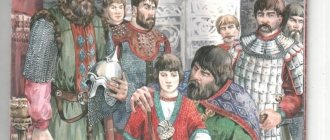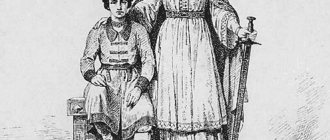Alexander Yaroslavich Nevsky (1221–1263) - Prince of Novgorod, Kiev, Vladimir from the Rurik family, a great commander and talented diplomat. It was under his rule that Rus' was able to defend its independence from the Catholic West. Known for his victories in the battles of the Neva and Lake Peipsi.
The material was prepared jointly with a teacher of the highest category
Alexandrova Ekaterina Valerievna.
Experience as a history and social studies teacher - 11 years.
Death and legacy
Alexander Nevsky died on November 14, 1263 in Gorodets and was buried in the Nativity Monastery in the city of Vladimir. By order of Peter I, his relics were transferred to the Alexander Nevsky Monastery (St. Petersburg) in 1724.
Alexander Yaroslavich Nevsky plays an exceptional role in the history of Rus'. Throughout his entire life, Grand Duke Alexander Nevsky did not lose a single battle. He was considered the favorite prince of the clergy, the patron of the Orthodox Church. He can be briefly described as a talented diplomat, a commander who was able to protect Rus' from many enemies, as well as prevent the campaigns of the Mongol-Tatars.
Nowadays, streets and squares are named after him, monuments have been erected in his honor, and Orthodox churches have been erected in many cities of Russia.
Origin
The boy was born into the family of the Pereyaslavl prince and Toropets princess - Yaroslav Vsevolodovich and Rostislava Mstislavna.
The father ruled first in Pereyaslavl itself, then became the head of one of the richest cities of Rus' at that time - Novgorod, and even later took the throne of Kyiv.
Observing what his father did during his life, Alexander Nevsky learned diplomacy from him, and very early this science had to be applied.
The future famous commander had eight brothers and two sisters. The future ruler was second in seniority and was born on May 30, 1221 in Pereslavl-Zalessky.
Already at the age of four, the father christened his eldest sons, Alexander and Fedor, warriors, with the help of tonsure. Around the same time, boys began to be taught military training.
This is interesting! Prince Yuri Dolgoruky: an interesting short biography
Childhood and the beginning of his reign
The biography of Alexander Nevsky began in Pereyaslavl-Zalessky, where his family lived. He was born on May 13, 1221. Alexander Nevsky's father was Yaroslav Vsevolodovich (at that time the Pereyaslavl prince), from whom the child received his patronymic, the second parent was Rostislava Mstislavna, the daughter of the Novgorod and Galician prince. Unfortunately, a complete and reliable biography of the prince has not been preserved. The information is mainly known from the literary story “The Tale of the Life of Alexander Nevsky,” the text of which has been preserved in 13 editions.
In 1225, Yaroslav performed a ceremony of initiation into warriors for his sons in the Transfiguration Cathedral. After this event, the reign of Alexander Nevsky began, in which several main events can be distinguished:
- After 3 years (in 1229), Yaroslav Vsevolodovich left his eldest son Fyodor and Alexander in Novgorod under the supervision of a boyar. Prince Yaroslav himself went with the army to Riga. However, famine began in the city, and in February 1229 the boyar and the young princes fled, fearing reprisals from the rebel townspeople.
- The next year, the Novgorodians again called upon Yaroslav Vsevolodovich, who, after staying in the city for 2 weeks, placed his sons on the throne and left.
- After 3 years, Fyodor Yaroslavich died, leaving Alexander alone.
- In 1236, Prince Yaroslav left for Kyiv, leaving Novgorod to 15-year-old Alexander.
Written sources contain information that in 1238, Prince Yuri Dmitrievich of Vladimir, during the Mongol invasion of the northeast, expected help from his brothers, princes Yaroslav and Svyatoslav, but there is no information that Novgorod regiments took part in the battle. The Mongols themselves did not reach Novgorod, turning back after the siege of the city of Torzhok.
Great Battles
Prince Alexander Nevsky is a commander who never lost a single battle in his entire life. At the same time, there are two major victories that everyone who is even slightly familiar with the history of the Russian land knows about.
Battle of Neva
At the beginning of the 13th century, the peoples of the Baltic, Swedish, Karelian and Finnish tribes, whose territories were located nearby, constantly carried out mutual raids on each other for the purpose of robbery.
At this time, Sweden tried to impose its faith on the surrounding region and made attempts to seize power, especially on the economically significant banks of the Neva.
Against this background, in July 1240, the Swedes landed from ships at the place where Izhora flows into the Neva. The watchmen who noticed this hastened to report the information to Alexander, who immediately moved towards the enemy.
This is interesting! Who is Ivan Susanin: a short biography and a story about his feat
According to the chronicles, he did not ask for reinforcements from his father, Prince Yaroslav, but went with a small squad that was within walking distance. On the way, they were joined by part of the garrison from the fortress on Ladoga.
The army, quickly moving on horseback, quickly overtook the Swedes and, thanks to the valor of the warriors themselves, defeated the Swedes, who had not yet managed to gain a foothold on the ground.
According to ancient sources, Alexander personally struck the leader of the Swedish army, Earl Birger, leaving a noticeable scar on his face from his spear.
After this battle, legends began to be composed about Alexander Nevsky with precisely this epithet. The commander received it after his brilliant victory on the Neva, in which he showed himself to be a talented commander and a brave warrior.
Battle on the Ice
After the Pope announced a crusade against Finland in 1237, a year later, the Danish king and the head of the Teutonic Order decided to begin military operations on the territory of Rus'.
After the defeat of the Swedes in 1940, the same year the united army entered the lands of the Novgorod principality.
At the same time, the boyars of this rather rich region managed to drive out Nevsky Alexander.
The invader’s army quite easily took Izborsk, besieged it and eventually took Pskov in a week, then Koporye and the lands of the leaders, coming very close to Novgorod. Influential boyars asked Yaroslav for help. He, in turn, wanted to send Andrei to command the army, but the Novgorodians specifically requested Alexander.
Arriving in Novgorod in 1241, the prince took Koporye, demonstratively killed the garrison, and executed prisoners from among the Chud people. In 1242, having waited for the arrival of Andrei with the princely army, he recaptured Pskov. As a result, enemy forces were concentrated in the Dorpat bishopric.
This is interesting! What is the significance of the Battle of Kulikovo: succinctly and briefly about its course and result
There, the commander lost several advanced detachments during the assault, but quickly retreated to the ice of Lake Peipsi, forcing the enemy to attack on his own. The character of Alexander Nevsky allowed him to withstand a frontal attack calmly and let the enemy get close enough.
The forces of the Catholic army crashed into the ranks of the Slavs in a special formation - a pig, immediately moving significantly deeper. At this time, Prince Alexander's cavalry attacked from the flanks, blocking the retreat routes. Finding themselves in a ring, the army lost many soldiers, the rest began to retreat across the ice of Lake Peipsi.
It is noteworthy that not a single chronicle, even briefly, mentions that the warriors of the order and the Danish king drowned and fell under the ice. Mentions of this appear in much later sources, written by chroniclers following the example of other battles.
Battle on the Ice
Another great battle of Alexander Yaroslavich took place on April 12, 1242 on the shores of Lake Peipus.
In August 1240, the Teutonic Order began a campaign against Rus'. Pskov, the Koporye fortress and the lands of the Vozhan tribe were captured. The enemy approached to a distance of 30 versts to Novgorod, after which the boyars called on Alexander Nevsky to return. Upon his return, he liberated Koporye, and in March 1242, uniting with the Vladimir troops led by Prince Andrei, he returned Pskov.
The knights gathered the main forces in the city of Dorpat (now Estonia). After the defeat of the vanguard, Alexander retreated to the frozen lake for a decisive battle.
The battle began in the morning: at first the enemy, lining up as a “pig,” broke through the Russian ranks, but soon found himself surrounded on the flanks and killed. It is worth noting that written sources written close to that time do not mention the knights falling through the ice. Perhaps this detail is actually fictitious and taken from The Tale of Bygone Years for beauty .
After the defeat of the enemy, the Teutonic Order concluded a peace agreement with Novgorod, abandoning all territorial seizures. The next attempt to capture Pskov occurred only 10 years later.
According to some reports, the Pope offered Alexander Nevsky to convert to Catholicism and thus protect Rus' from the attacks of the Order, but he refused.
Character and personality description
The years of Nevsky's life are known thanks to his biography, which was written only a hundred years after his death, in the monastery in which the prince himself was buried.
Before this, only a short biography of the prince was passed on from mouth to mouth.
He was a strong-willed man with a tough, military-like character, was capable of well-thought-out adventures, and was actively developing politically.
All his life, the character of Alexander Nevsky was hated by the Novgorod boyars, since he ruled the principality harshly and at his own discretion, not wanting to please the political elites. For this he was repeatedly expelled from Novgorod.
Nevsky's contemporaries, despite all his merits, considered him first of all a great commander, and only then a leader or politician. This is clearly evidenced by the boyars’ request to Yaroslav that he send him specifically to protect the Novgorod lands from the Teutonic Order.
The prince at an early age married Alexandra, the daughter of the prince of Vitebsk and Polotsk Bryacheslav. Later there is evidence that he was married to a certain Vassa, but there are opinions that this is the same woman, just under a church name.
Interesting! The prince and his wife had five children - four boys and one girl. All of them lived relatively long lives and were princes of various regions in Rus'. The daughter married the appanage prince of Smolensk Konstantin Rostislavovich.
Politics with West and East
Nevsky's policies still cause a lot of controversy and doubt. On the one hand, Alexander courageously fought against the Western invaders who tried to impose Catholicism on the population of Rus', eradicating Orthodoxy with fire and sword.
Interesting Facts:
- At the moment, Western historians believe that the threat from the Teutonic Order and the leadership of the Catholic Church was greatly exaggerated.
- Some Russian historians support pro-Western sentiments, while others adhere to the history traditional for the Slavic region.
- Nevsky is also positioned as a great personality by the Russian Orthodox Church, which considers him a defender of the faith.
- In 2008, Russians elected him man of the year and a symbol of their people.
On the other hand, Alexander Nevsky spent his whole life looking for a compromise with the Tatar-Mongol horde and suppressed any attempts to rebel against, convincing the population to pay tribute and conduct censuses.
The prince repeatedly went to the horde, bowing to Batu, despite the fact that he poisoned his father and, as a result of the uprising, destroyed his brother.
Icon in honor of Alexander Nevsky
The time in which this man ruled was truly difficult - the triple threat of Rus', constant raids and conquests, the influence of the Tatar-Mongol yoke - all this tore and destroyed Rus' from the inside. The figure of the prince in political terms can be viewed from two angles:
- Defender of the Orthodox land, who realized that it was impossible to repel the attacks of all the enemy at once and chose to preserve his faith, and not his territory, fighting off Catholicism and submitting to the horde.
- A traitor to the Russian land, who with the help of the horde strengthened his power, got rid of his brother-heir to the throne and began to rule the Principality of Kyiv.
This is interesting! Rurikovich dynasty: family tree of the family with years of reign
This personality can be viewed in different ways, but this man managed to maintain the integrity of the state, repel multiple raids and stabilize the situation within the country.
Wikipedia mentions the dual perception by some historians of the personality of Prince Nevsky, but no one at the state level managed to make changes to the traditional history of Rus'.
Some people even doubt the answer to the question of why Alexander Nevsky was named that way - some historians believe that such a battle did not exist at all.










